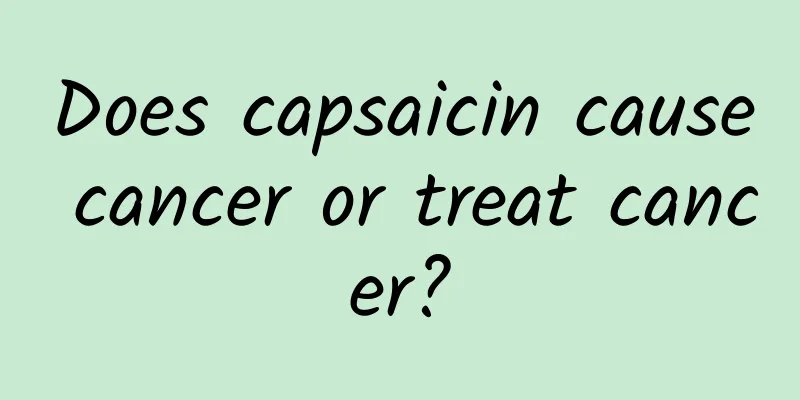Does capsaicin cause cancer or treat cancer?

|
In the cold winter, hot and spicy food seems to help us resist the cold. But there are reports that studies have found that chili peppers may cause stomach cancer, so it is best to refuse this spicy taste. But some people also say that scientists have found that chili peppers are the natural enemy of cancer, and eating more chili peppers can prevent and treat cancer. Does chili pepper cause cancer or treat cancer? Chili peppers and capsaicinWhen we talk about or study whether chili peppers are carcinogenic or anti-cancer, we are actually talking about the relationship between capsaicin, the active ingredient of chili peppers, and cancer. Capsaicin, a vanilloid amide alkaloid, gives chili peppers a spicy taste. It can bind to the vanilloid receptor subtype 1 (VR1) of sensory neurons (this receptor is also activated when the body is stimulated by heat), promote the release of the neurotransmitter substance P, and thus transmit information to the brain, so that we feel a burning sensation when eating chili peppers. This process also promotes the release of endorphins in the brain, which makes us feel euphoric, which is why we feel hearty and irresistible when we are gasping for air from the spiciness. Capsaicin and cancerCarcinogenicity: In 1994, the American Journal of Epidemiology reported a case-by-case study conducted by a group of Mexican researchers in Mexico City between 1989 and 1990. The statistical results showed that people who ate red peppers had a higher risk of gastric cancer than those who did not eat red peppers.[1] The same case-by-case study was conducted in three regions of Mexico between 1994 and 1996. This time, they measured the capsaicin content of different peppers and found that the high-dose capsaicin group (90-250 mg per day, equivalent to eating 9-25 red peppers per day) had an increased risk of gastric cancer compared with the low-dose capsaicin group (0-29.9 mg per day, equivalent to eating less than 3 red peppers per day).[2] However, when discussing the relationship between chili peppers and gastric cancer, these two papers rigorously used words such as "possible" and "related factors", but did not explicitly conclude that chili peppers are carcinogenic. In 2006, Nuray Erin and others from Pennsylvania State University confirmed that capsaicin caused a decrease in the expression of some genes in breast cancer cells. All of these genes are related to cell growth, proliferation and cancer progression. Therefore, they believed that capsaicin enhanced the spread of breast cancer cells by reducing the expression of genes related to apoptosis in mouse breast cancer cells [3]. In 2010, Korean scientists drew attention to the relationship between chili peppers and skin cancer. Their research results were published in the well-known American academic journal Cancer Research. However, they believe that capsaicin is only a co-carcinogen (it does not have a carcinogenic effect itself, but can promote the carcinogenic effect of carcinogens when it acts together with carcinogens), and plays a promoting role in the skin cancer induced by 12-oxo-tetradecanoylphorbol-13-acetate (TPA) [4]. Cancer treatment: Although the two epidemiological studies mentioned above cannot clearly prove that eating too much chili peppers can lead to gastric cancer, they may have begun to make foodies who cannot enjoy every meal without chili peppers worried: chili peppers are so irritating to the gastrointestinal tract, so they should cause cancer, right? In fact, there is another side to the research on capsaicin and gastrointestinal cancer. Cell experiments have shown that gastric cancer cells are more susceptible to apoptosis induced by capsaicin than normal cells[5], and capsaicin can also cause apoptosis of human colon cancer cells[6]. In addition, we are always advised to eat less spicy food, especially when gastrointestinal function is poor. However, studies have shown that capsaicin can protect the gastric mucosa and treat gastric ulcers by inhibiting gastric acid secretion and increasing gastric mucosal blood flow[7]. In 2008, the famous American academic journal Apoptosis published a study by the University of Pittsburgh School of Medicine on capsaicin and the “king of cancers” - pancreatic cancer. The researchers found that capsaicin can induce apoptosis of human pancreatic cancer cells cultured in vitro, but has no effect on normal pancreatic cells[8]. They then conducted an in vivo experiment on rats: rats transplanted with human pancreatic tumors were fed capsaicin (2.5 mg/kg body weight, 5 times a week; or 5 mg/kg body weight, 3 times a week). The results showed that capsaicin could inhibit the growth of pancreatic tumors, and no side effects were observed. A research group at California State University conducted a study on capsaicin and prostate cancer with basically the same design and feeding dosage as this experiment, and also obtained similar results [9]. In addition, in recent years, there have been reports that capsaicin induces apoptosis in mouse bladder cancer cells, human liver cancer cells and other cancer cells [10][11]. Does it cause cancer or cure cancer?Whether chili peppers can treat cancer or cause cancer has always been a controversial issue in the scientific community. Not only have researchers been unable to come to a clear conclusion on the relationship between capsaicin and cancer, but there is also controversy over its effects on the same type of cancer. For example, for prostate cancer, some studies have shown that capsaicin can induce apoptosis of prostate cancer cells and inhibit the growth of xenografted prostate tumors[9], but other studies have shown that capsaicin can promote the proliferation of prostate cancer cells[12]. This tangled relationship between capsaicin and cancer requires more research to clarify. One thing that needs to be made clear is that these studies on the carcinogenicity or anti-cancer properties of capsaicin, regardless of whether the results are what we expect, capsaicin promotes cancer cell growth or induces cancer cell apoptosis, which does not mean that the chili peppers we eat are carcinogenic or cure cancer. Because, first of all, although the results of cell experiments and animal experiments can provide ideas and basis for further clinical experiments, there is still a big gap between them and clinical experiments. The results of animal experiments may not be reflected in the human body, and its other effects on the human body and issues regarding usage and dosage also need to be resolved; secondly, there are many other substances in peppers. Whether the capsaicin contained in the peppers eaten can produce the same effect as pure capsaicin is still unknown, and there is currently a lack of research on the kinetics of capsaicin after it enters the human body. Conclusion: There is no consensus in the scientific community on whether capsaicin can cause cancer, cure cancer, or assist in causing cancer. Moreover, the results of these cell or animal experiments cannot be directly equated with clinical trials. |
<<: What to do if your hands get burned by cutting peppers
>>: Can peppers really help you lose weight?
Recommend
What are the benefits of drinking red wine?
Red wine is the noblest drink among people. It is...
How is Super Cheapskate? Super Cheapskate review and website information
What is Radins.com? Radins.com is a famous French ...
Beef porridge recipe
How many methods do you know about beef porridge? ...
The nutritional value and therapeutic value of strawberries
Strawberries give people a feeling of freshness a...
What is the use of expired milk? What is the use of expired milk?
People often drink milk, but the shelf life of fr...
The efficacy and function of Colombian dragon fruit
Colombian Dragon Fruit is a small fruit that is m...
What the fuck is this? This is a review and website information
What kind of website is this? Motherfucking Websit...
Milk Peanut Porridge
I believe everyone is familiar with milk peanut p...
How to make strawberry jam
I believe that many female friends will love the ...
How is Bain & Company? Bain & Company reviews and website information
What is Bain & Company? Bain & Company is ...
The difference between floating wheat and wheat How to distinguish wheat from floating wheat
Floating wheat and wheat are very similar in name...
How to brew instant coffee? Methods and techniques for brewing instant coffee
Many people like to drink coffee, but they think ...
How to brew ground coffee powder? How to brew ground coffee powder?
Coffee has now penetrated into people's lives...
The efficacy and function of the widespread red orchid
The widespread red orchid is a rare wild flower, ...
Nutritional value of health porridge
I don’t know if you understand the nutritional va...









